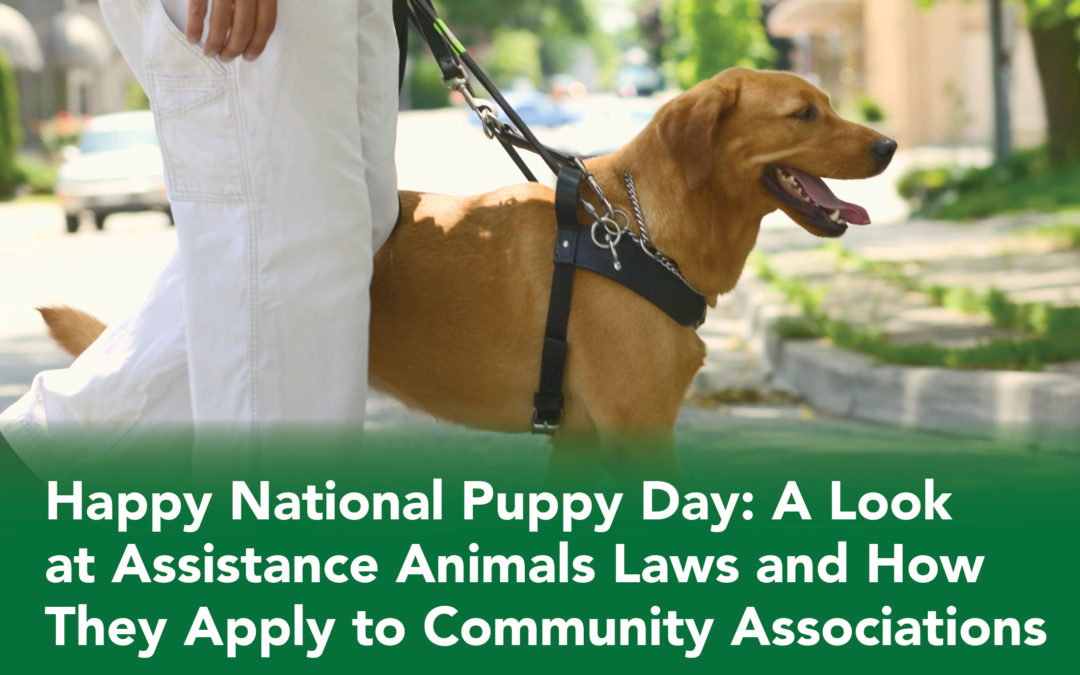Today is National Puppy Day, where dog owners and dog lovers come together over their shared appreciation for these four-legged companions. Established in 2006, National Puppy Day also is meant to raise awareness of the number of dogs that need to be rescued each year (particularly from puppy mills) and help prospective pet owners consider adoption.
Community associations residents should be aware of any pet policies before getting a dog, especially those pertaining to assistance animals. Assistance animals are not considered pets subject to restrictions from the community association’s governing documents. Therefore, most pet-related policies are not applicable to residents with assistance animals.
Assistance animals play an important role in the lives of people with disabilities. The federal Fair Housing Act (FHA), the Americans with Disabilities Act, as well as state and local laws govern assistance animals in community associations. Assistance animals are categorized into three groups:
- Service animals. Specifically trained to work or perform tasks for individuals with physical disabilities.
- Therapy animals. Provide psychological or physiological benefit to individuals or groups in a clinical environment.
- Emotional support animals. Provide comfort for people with mental health issues.
Community associations must recognize the rights of individuals with disabilities to receive the assistance they need within their home and must comply with federal laws guaranteeing such rights.
For years, CAI has urged the U.S. Department of Housing and Urban Development (HUD) to help community association residents, boards, and managers navigate the process of approving assistance animals. In January 2020, HUD released clarification with several key and helpful points, including clarification related to documentation from the internet, observable versus nonobservable disabilities, and types of animals that may qualify as assistance animals.
Documentation from the internet (Page 11 of January 2020 Guidance)
Some websites sell certificates, registrations, and licensing documents for assistance animals to anyone who answers certain questions or participates in a short interview and pays a fee. Under the FHA, a housing provider may request reliable documentation when an individual requesting a reasonable accommodation has a disability and disability-related need for an accommodation that are not obvious or otherwise known. In HUD’s experience, such documentation from the internet is not, by itself, sufficient to reliably establish that an individual has a nonobservable disability or disability-related need for an assistance animal.
By contrast, many legitimate, licensed health care professionals deliver services remotely, including over the internet. One reliable form of documentation is a note from a person’s health care professional that confirms their disability and/or need for an animal when the provider has personal knowledge of the individual’s condition.
Type of Animal (Page 13 of January 2020 Guidance)
If the animal is commonly kept in households, the reasonable accommodation should be provided under the FHA unless if falls under the general exceptions described in this section. Animals commonly kept in households include dogs, cats, small birds, rabbits, hamsters, gerbils, other rodents, fish, turtles, or other small, domesticated animals that are traditionally owned for pleasure rather than for commercial purposes. For purposes of HUD’s assessment, reptiles (other than turtles), barnyard animals, monkeys, kangaroos, and other nondomesticated animals are not considered common household animals.
A reasonable accommodation need not be provided if the animal is not commonly kept in households except in specific circumstances. If the individual is requesting to keep a unique type of animal, he or she has the substantial burden of demonstrating a disability-related therapeutic need for the specific animal. The individual is encouraged to submit documentation from a health care professional
confirming the need for this animal, which includes information of the type of animal contained in the Guidance on Documenting an Individual’s Need for Assistance Animals in Housing.
Observable and Nonobservable Disabilities (Page 9 of January 2020 Guidance)
Under the FHA, a disability is a physical or mental impairment that substantially limits one or more major life activities. While some impairments may seem invisible, others can be readily observed.
Observable impairments include blindness or low vision; deafness or being hard of hearing; mobility limitations; and other types of impairments with observable symptoms or effects such as intellectual impairments (including some types of autism), neurological impairments (e.g., stroke, Parkinson’s disease, cerebral palsy, epilepsy, or brain injury), mental illness, or other diseases or conditions that affect major life activities or bodily functions. Observable impairments generally tend to be obvious and would not be reasonably attributable to nonmedical causes by a lay person.
Certain impairments may not be observable, including impairments that may form the basis for a request for an emotional support animal,. In those instances, a housing provider may request information regarding both the disability and the disability-related need for the animal. Housing providers are not entitled to know an individual’s diagnosis.
Check out CAI’s Guide to Assistance Animals to learn the differences between them and the applicable federal and state laws. CAI and its members support the FHA, which prohibits housing discrimination based on race, color, religion, sex, familial status, national origin, or disability.
CAI also created guides for board members, community managers, and residents who want to know more about assistance animals:



